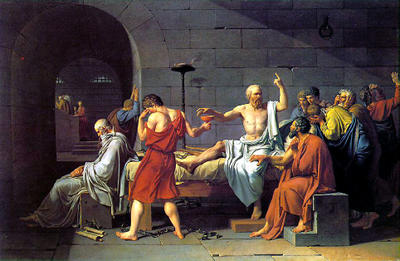SOCRATES: Now, when a person has this knowledge, and is considering something which he sees or hears, may not false opinion arise in the following manner?
THEAETETUS: In what manner?
SOC. When he thinks what he knows, sometimes to be what he knows, and sometimes to be what he does not know. We were wrong before in denying the possibility of this.
THEAET. And how would you amend the former statement?
SOC. I should begin by making a list of the impossible cases which must be excluded. (1) No one can think one thing to be another when he does not perceive either of them, but has the memorial or seal of both of them in his mind; nor can any mistaking of one thing for another occur, when he only knows one, and does not know, and has no impression of the other; nor can he think that one thing which he does not know is another thing which he does not know, or that what he does not know is what he knows; nor (2) that one thing which he perceives is another thing which he perceives, or that something which he perceives is something which he does not perceive; or that something which he does not perceive is something else which he does not perceive; or that something which he does not percieve is somthing which he perceives; nor again (3) can he think that something which he knows and perceives, and of which he has the impression coinciding with sense, is something else which he knows and perceives, and of which he has the impression coinciding with sense; -- this last case, if possible, is still more inconceivable than the others; nor (4) can he think that something which he knows and perceives, and of which he has the memorial in good order, is something else which he knows; nor if his mind is thus furnished, can he think that a thing which he knows and perceives is another thing which he perceives; or that a thing which he does not know and does not perceive, is the same as another thing which he does not know and does not perceive, is the same as another thing which he does not know and does not percieve; -- nor again, can he suppose that a thing which he does not know and does not perceive is the same as another thing which he does not know; or that a thing which he does not know and does not perceive is another thing which he does not perceive: -- All these utterly and absolutely exclude the possibility of false opinion. The only cases, if any, which remain, are the following.
THEAET. What are they? If you tell me, I may perhaps understand you better; but at present I am unable to follow you.
SOC. A person may think that some thing which he knows, or which he perceives and does not know, are some other things which he knows and perceives; or that some things which he knows and perceives, are other things which he knows and perceives.
THEAET. I understand you less than ever now.


1 comment:
so which one of the characters in the picture represents matt in his classical philosophy class? i saw it's the exasperated young guy in the red toga to the left of socrates. ;-)
Post a Comment